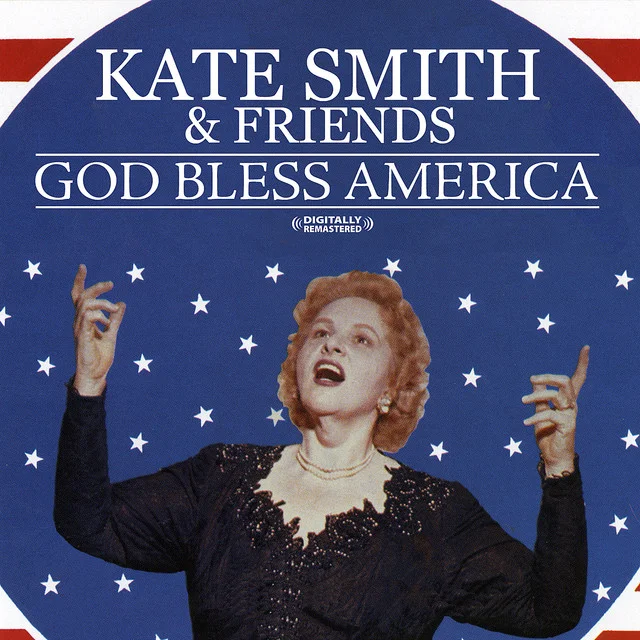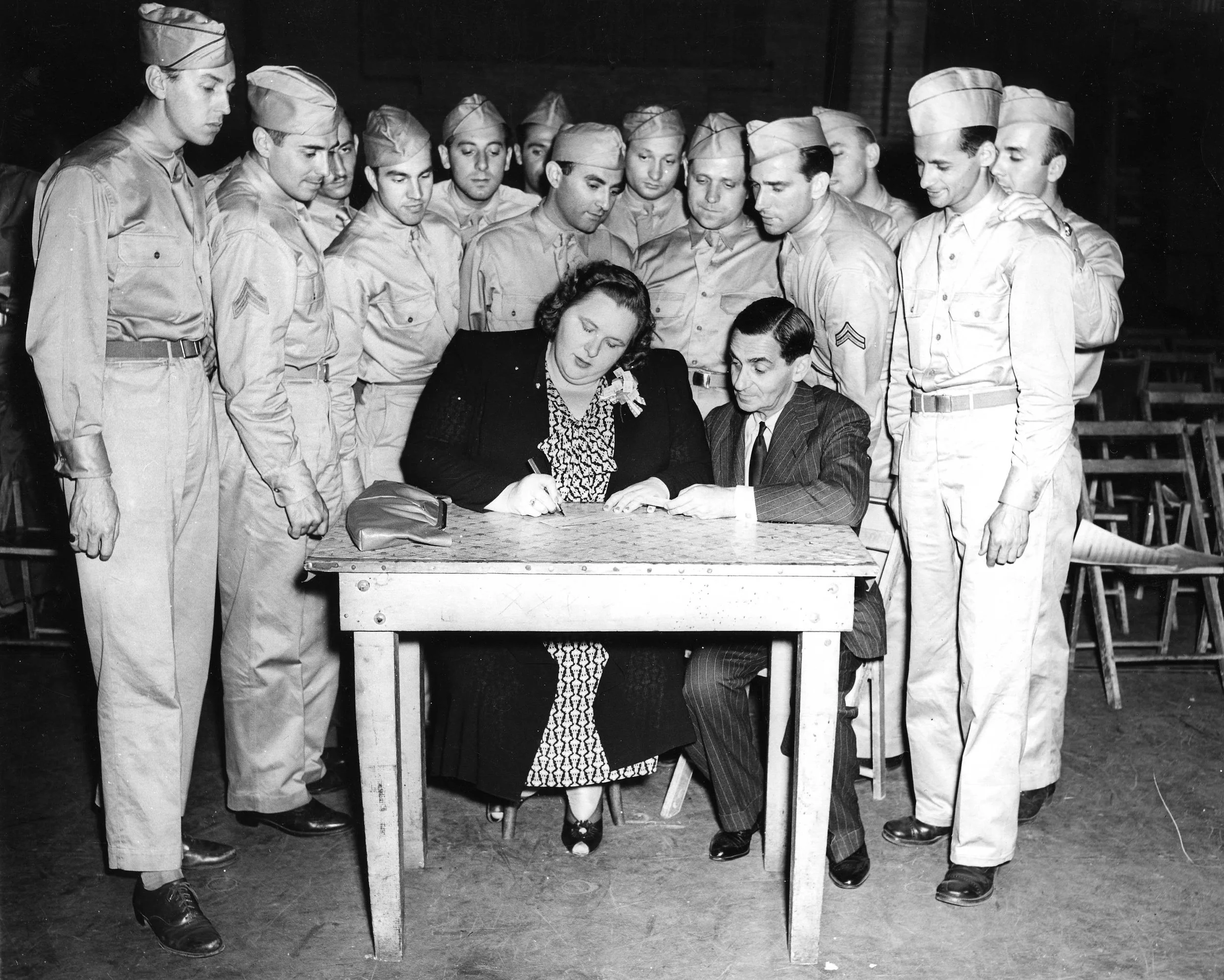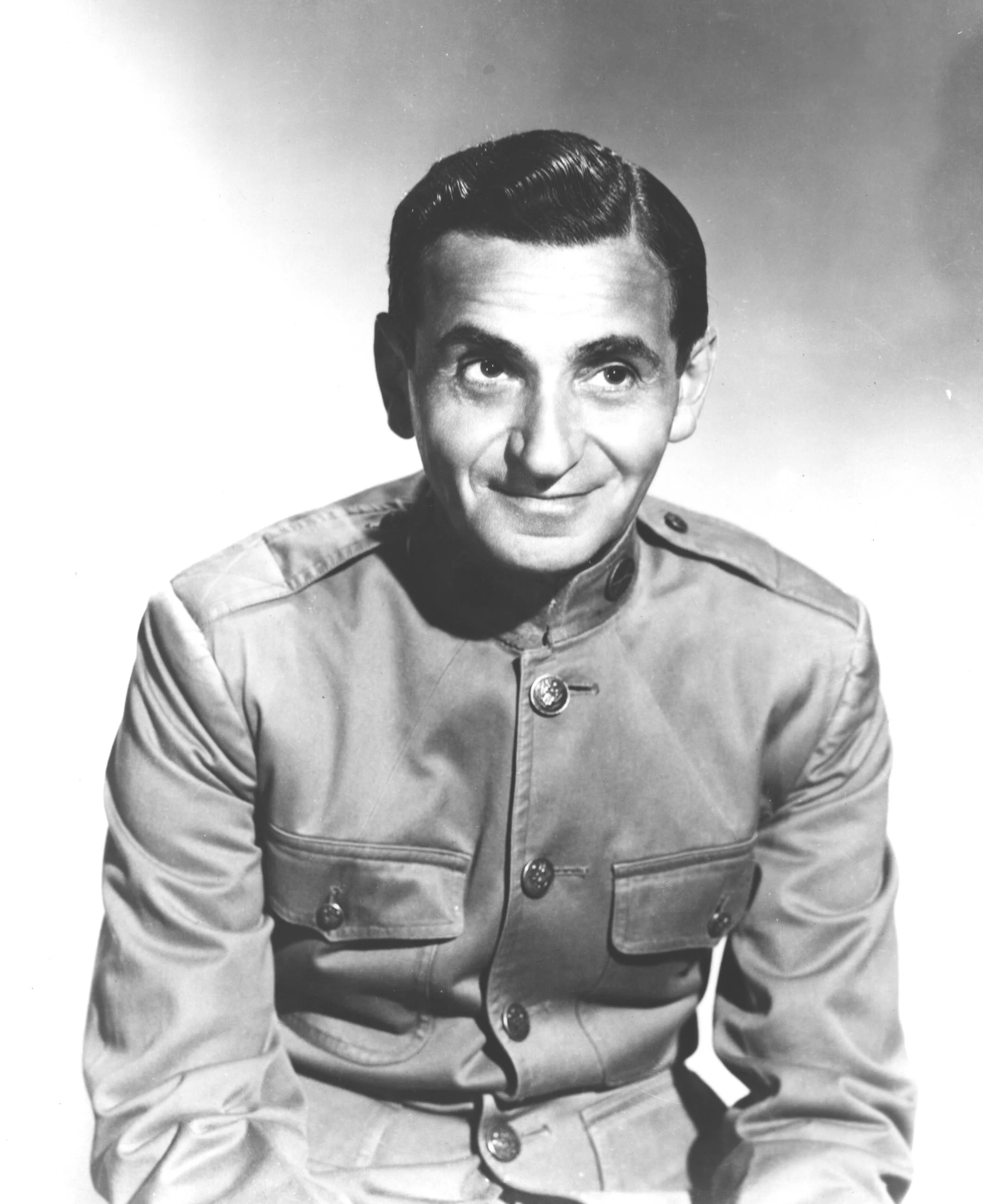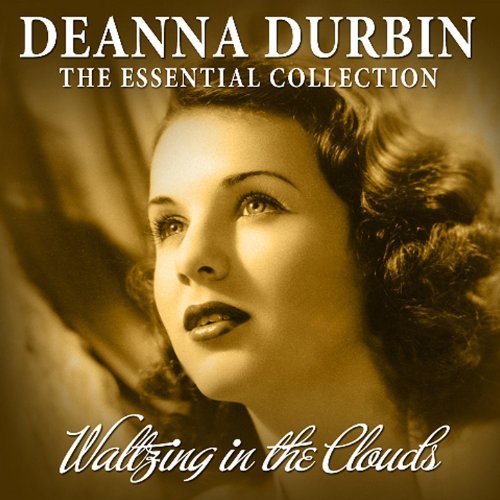god bless america
Berlin wrote the song on his way back to America after attending the London premiere (September 30, 1938) of his film Alexander’s Ragtime Band. Introduced by Kate Smith on her CBS radio show, The Kate Smith Hour, on November 10, 1938. Smith premiered the song late in the show and prefaced it with the following words: "And now it’s going to be my very great privilege to sing for you a song that’s never been sung before by anybody. One that was written especially for me by one of the greatest composers in the music field today. It’s something more than a song - I feel it’s one of the most beautiful compositions ever written, a song that will never die. The author - Mr. Irving Berlin. The title - 'God Bless America.'"
Irving Berlin with Kate Smith
Berlin described how he wrote “God Bless America” in a letter of July 19, 1954, to Abel Green, editor of Variety: "I wrote 'God Bless America' at Camp Upton in 1918 to be the finale of Yip, Yip, Yaphank. As you may remember, the show opened on August 19th at the Old Century Theater. The finale - the boys were alerted in the scene before that they were going overseas, and in overseas outfits, including helmets, they marched through the Theater, went out to the street and backstage where they boarded a transport, and as the lights lowered, the transport, on wheel, slowly moved off stage. It was a very touching and emotional scene. As I remember, the song they sang was 'In the Y.M.C.A.' as the curtain came down. Having that finale in mind, it seemed painting the lily to have soldiers sing 'God Bless America' in that situation, so I didn’t use it. Of course, I always had it in back of my mind to use someday on the right occasion. That occasion came after I returned from London in 1938 where I had gone to see the opening of Alexander’s Ragtime Band, the picture. I was there during Chamberlain’s visit to Hitler and the beginning of the Munich pact. On my way back, I tried to write a song that I felt at that time. I remember finishing a chorus of a song called 'Thanks America' which I tore up because it was very bad. It seemed a bad editorial set to music. I then recalled 'God Bless America' and rewrote it. I underline rewrote because that is a very important part of the story of 'God Bless America.' "
"The original version was as follows: 'God Bless America / land that I love / Stand beside her / And guide her /To the right with a light from above / Make her victorious on land and foam / God Bless America, my home sweet home.' It is obvious that the word 'right' had to be changed because in 1918 “guide her to the right” meant the right road. In 1938, there was a right and a left and it had a different significance. So in changing it the song was improved when I said 'stand beside her and guide her, thru the night with a light from above.' Then again, in 1918 it was written as a war song, which the phrase 'make her victorious on land and foam' indicates. In 1938, I didn’t want it to be a war song. I wanted it to be a song of peace. On Armistice Day, 1938, I spoke to Ted Collins [Smith’s manager] and he wanted a song for Kate Smith to sing on that program, where she introduced it."
Over the years Berlin and his longtime friend and onetime (1918) musical secretary, songwriter Harry Ruby, frequently exchanged humorous letters. On October 26, 1971, Berlin wrote to Ruby about “God Bless America” as follows: "I was interviewed a few weeks ago about 'God Bless America,' and one of the questions was, 'Is it true that Harry Ruby helped you keep it away from the public for twenty years?' That came out of left field, but he evidently read it somewhere and, Harry, as an old friend, I defended you. I told him that the one and only time I played and sang it was at a rehearsal where you were present. The reaction from the boys was a thunderous silence and that you, as a civilian, were the only one who stood up and saluted. Seriously, Harry, I told the interviewer the simple facts - that the song was never taken down, that I did let the boys hear it and decided that 350 soldiers in overseas outfits marching down the aisle of the Century Theater going off to war, singing 'God Bless America,' was wrong. So, as you will remember, I replaced it with a little thing called 'We’re On Our Way To France.' If the late Ted Collins, who was Kate Smith’s manager, hadn’t come to me in 1938 for a patriotic song to be sung by her on Armistice Day, I’m afraid 'God Bless America' would still be a war song, unpublished and unsung."
The response to “God Bless America” was overwhelmingly positive. It received enormous attention in the press and from the public. Yet there was sharp criticism as well. In answer to those who questioned the sincerity of his lyric and his reference to God, Berlin had this to say: “ ‘God Bless America’ is a patriotic song written so it can be sung and understood by everyone. It is not a hymn or an anthem. It is just a song. What’s wrong with a patriotic song?” Berlin’s response was simple and eloquent: “All that I hope for ‘God Bless America,’” he told the New York Herald-Tribune (October 10, 1940), “is that it will continue to be popular, especially in these days when so many people feel a need for some vocal expression of their patriotism.” The tremendous success and popularity of the song led to some unanticipated controversy. In the summer of 1940, both major national parties sought to appropriate it for their conventions. In a July 16, 1940, letter to W. F. Maloney, an official of the Democratic Party, Berlin wrote:
"In reply to your inquiry, no political party has the exclusive rights to the song 'God Bless America'. In our grant to the Republican Party Campaign Committee for Wendell L. Wilkie [sic] we specifically mentioned the fact that we could not give the exclusive rights to any political party to a song that is so obviously for all Americans." Many Americans, in fact, found the song so powerful and compelling that they lobbied for it to replace "The Star-Spangled Banner” as the United States national anthem. In an August 16, 1943, letter to the well-known author Dale Carnegie, Berlin wrote: "I think it would be a mistake to suggest changing our National Anthem. I am, of course, touched and flattered that you think so highly of 'God Bless America' but in my opinion, the 'Star Spangled Banner' cannot be replaced.
Berlin also offered a more detailed response to those who wish to make the song our national anthem. He said: "A national anthem is something that develops naturally through age, tradition, historic significance, and general recognition. There is no such thing as a new national anthem. We can’t legislate one. They arise alone and stand the test of time. We’ve got a good national anthem. You can’t have two." In 1940 Berlin established the God Bless America Fund, a trust that over the years has turned all income for the song over to the Girl Scouts and Boy Scouts of America. As the years passed, “God Bless America,” despite the objections of its creator, became our unofficial de facto national anthem.
Of course, there were notable recordings, none more impressive than those by Kate Smith, who also sang it thrillingly in the 1943 film version of This Is the Army. Deanna Durbin sang it in the 1943 film Hers to Hold; and the great opera singer Lotte Lehmann and a young Marni Nixon, dubbing for Margaret O’Brien, sang it in the 1948 film Big City. For many years a Kate Smith recording was played at Philadelphia Flyers hockey games, and for especially key contests Smith was on hand to sing it in person. Berlin himself sang it on television in 1968 during an eightieth birthday tribute presented on The Ed Sullivan Show and sang it again, most movingly, at the White House in 1974 in honor of returning Vietnam War prisoners. It was his last public appearance.
Excerpt(s) from The Complete Lyrics of Irving Berlin edited by Robert Kimball and Linda Emmet, copyright © 2001 by The Estate of Irving Berlin, Robert Kimball, and Linda Emmet. Used by permission of Alfred A. Knopf, an imprint of the Knopf Doubleday Publishing. Group, a division of Penguin Random House LLC. All rights reserved.





